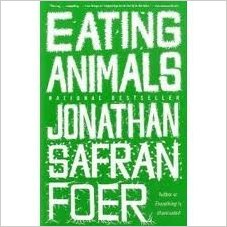
Reprinted from Eating Disorders Review
May/June 2011 Volume 22, Number 3
©2011 Gürze Books
(By Jonathan Safran Foer. Back Bay Books, Little Brown and Company, 2010. $14.99; 341 pages.)
Although Eating Disorders Review has not previously taken on food politics or food philosophies, these issues are often not far from the thoughts of many of our patients, and of many clinicians treating them. During a recent Academy of Eating Disorders plenary session, for example, Yale’s Kelly Brownell discussed the fact that eating disorders experts might expect to be called on by public policymakers for guidance concerning what to do about epidemic obesity. Certainly patients and families are already asking eating disorders experts for opinions about vegetarianism, veganism, and other aspects of food choices and eating behaviors on a daily basis. And, at some point the field might also be asked to weigh in (so to speak) on issues concerning public policy regarding food choices. In this context, it behooves us to become as well informed as we can be about public debates, practices and scientific aspects of the food industries and nutrition, so that whatever opinions we develop are informed by evidence as well as understanding of all sides of these issues.
If you haven’t already read them, please put the following books on your reading list: Marion Nestle’s Food Politics and Michael Pollans’ The Omnivore’s Dilemma. In the wake of these and other writings of this sort, now comes Jonathan Safran Foer’s thoughtful, bold and provocative book, Eating Animals. Jonathan Safran Foer has already earned considerable renown and esteem as a brilliant, award winning and bestselling novelist (“Everything is Illuminated” was already made into a film, and “Extremely Loud and Incredibly Close” has been critically acclaimed as well).
Based on extensive reading and his own field research, Eating Animals is a personally evolved, brilliantly told story, filled with detailed first-person accounts by factory farmers, slaughterhouse workers, humane ranchers, PETA (People for the Ethical Treatment of Animals) activists and others, in which Foer brings you face to face with aspects of the food chain that most of us have ignored, repressed, suppressed, and just plain don’t want to think about.
Foer’s own trajectory, from a grandson who adored his Jewish grandma’s Brooklyn chicken soup and consumer of carnivorous pleasures, to strict vegetarian, was facilitated and hastened by the birth of a son. His moral choice points were based primarily on what he’s learned about factory-farmed poultry, pork, fish and beef, as well as on how raising animals impacts our water supplies, health status, global warming, and world hunger. I won’t give away the details, but I can assure you that the book deserves an “R” rating for its violent and graphic depiction of how poultry, pigs, fish, and cows are factory-farmed, processed and killed.
Foer’s narratives, interviews, and internal and interpersonal deliberations, all backed by solid familiarity with and citation of pertinent literature, are written in a direct and engaging style that challenges readers to think and reflect. Although reading this book won’t necessarily immediately turn you into a vegetarian, after reading it you’re somewhat likely to become a more uncomfortable omnivore, and are almost certainly likely to think in a more complex way about how you eat and what you eat.
— J.Y.
